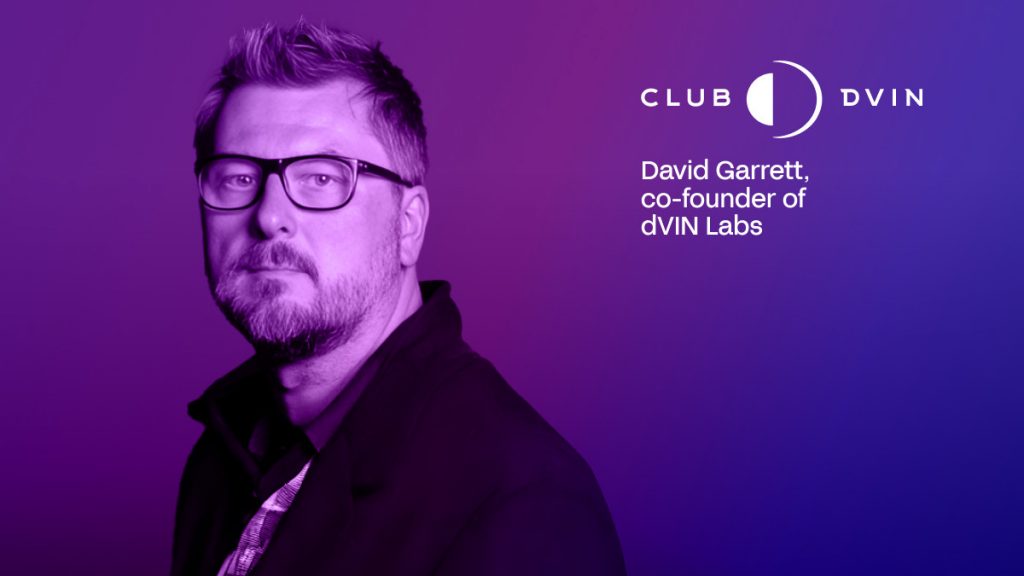From Grape to Blockchain: How David Garrett and dVIN are Fermenting a New Era of Transparency in the Global Wine Trade


In Brief
David Garrett, co-founder of dVIN, discusses the tokenization industry’s challenges, innovative solutions, and his vision for the future of luxury goods in the digital age, emphasizing the need for innovative solutions.

In this interview, we sit down with David Garrett, co-founder of dVIN, a pioneering company at the intersection of wine and blockchain. Garrett shares insights on the problems of the industry, the innovative solutions that should be developed, and his vision for the future of luxury goods in the digital age.
Can you share why you decided to tokenize wine?
I’ve been in the wine business, with a bit of a tech background, but mostly in the luxury, investment-grade, rare side of the wine business for about 20 years. I didn’t come to this looking to tokenize something and picking wine. I came to this trying to solve a real problem in the wine industry, one that I’ve been unable to solve for 20 years until we started looking at blockchain. I saw the solutions inside blockchain technology.
What is the problem that you were trying to solve for 20 years?
The problem is twofold. First, when you’re a winemaker and you make wine, as soon as it leaves the winery, you have no idea where it is. You sell it, it goes somewhere in the world, but you don’t have any idea where it is. You don’t have any idea who’s consuming it or when they’re consuming it. Because of that, it’s very difficult to make decisions about product development, marketing, messaging, packaging, and supply chain.
In the wine business, you can only make a certain amount of wine every year. If you send too much to one place and not enough to another, it screws you for several cycles because you can’t just make more. You have to wait until the next year.
The second problem is that in the wine business, unlike most other products, there’s a significant time gap between purchase and consumption. If you buy a great bottle of wine, you might wait eight, ten, or twelve years before opening that bottle. This separation between purchase and consumption creates even more opacity for the winemaker.
Without this data, it’s really hard for winemakers to make intelligent decisions about their wines. The industry is still working the same way it did 20 or 100 years ago. Winemakers are left working blind, which makes it very difficult for them to run better businesses.
How is DePIN transforming the supply chain?
Wine is a product where it’s very important for it to be stored and transported in proper temperature and humidity conditions. About one in 10 bottles of luxury wine ends up being bad, usually because it wasn’t stored or transported correctly.
We’re envisioning a decentralized physical infrastructure network where every bottle would have RFID or similar technology. As the bottle moves through the supply chain, it would reach RFID interrogators that would update the blockchain with the bottle’s location, temperature, and humidity data.
This system would create an incentive for the supply chain to provide better storage and transportation of wine. It would allow tracking of the bottle from “grape to glass,” all the way from the winemaker to your door. We think this could help save the industry $10 billion a year by reducing spoilage.
What are the most significant barriers to entry for luxury goods providers in the DePIN and blockchain sectors?
For luxury physical goods, I think the barriers to entry mostly revolve around getting the supply chain to understand the value. For some luxury products, the value is really about anti-counterfeit and anti-fraud measures. For others, the benefits come from inventory management or supply chain efficiency.
Another barrier is the way we talk about blockchain in the industry. I think that over time, you’re going to see more adoption as we talk less about the actual technology and more about its benefits. We need to stop trying to convince people that blockchain is important and instead focus on the benefits it can provide.
The wine industry is quite conventional and traditional. How do you encourage people to adopt blockchain?
We’ve abstracted it all out. We don’t talk to anybody about blockchain when we’re dealing with clients, customers, or winemakers. We talk about the benefits: data, loyalty programs, supply chain efficiency, the ability to see where products are being consumed, and connecting with customers at the moment of consumption. These things get winemakers excited.
Have you faced any regulatory problems while working with wineries?
There are regulations, but they’re actually encouraging the use of blockchain in some cases. For example, the EU passed a new regulation that requires every luxury product that either terminates or originates inside the EU to be connected to a digital product passport, which is basically a blockchain digital deed of ownership.
What’s interesting is that wine has been traded in both primary and secondary markets for hundreds of years. There’s been paperwork involved with the sale of wine for centuries. We’ve been working with our lawyers, and we don’t feel like there’s really any regulatory issue with creating a digital deed of ownership for a bottle of wine and then having that digital deed be tradeable.
Do you think blockchain implementation can influence wine tourism and different experiences related to vineyards?
Yes, we’re doing a bunch of that now. We’ve built a system called the Devon Protocol, which includes mechanisms for putting wine on the blockchain. When you open a bottle, you can use your phone to “burn” that asset and create a new token we call a tasting token. This token is soul-bound, meaning you can’t trade or sell it, but it comes with status and rewards from the winery.
These tasting tokens can provide access to experiences like barrel tastings, winemaker dinners, harvest experiences, or even discounts on more wine. It builds a connection between the winemaker and the wine lover, providing more access and fair access to great wine hospitality experiences.
What are the current trends in the tokenization of luxury collectibles?
I think the most important trend is moving from stovepipe projects to standardized protocols. Instead of having many separate, small-scale tokenization projects, we’re seeing a move towards unified, industry-wide protocols. This standardization allows for the development of more sophisticated financial products and services around these tokenized assets.
In the next five years, by 2030, I believe we’ll start seeing most luxury products acquire digital product passports or digital deeds of ownership. The EU has already put regulations in place to encourage this, and the benefits are remarkable. We’ll have hit the tipping point where most luxury goods, at least the scarce luxury products, will have some sort of blockchain-based digital deed of ownership or digital product passport.
Disclaimer
In line with the Trust Project guidelines, please note that the information provided on this page is not intended to be and should not be interpreted as legal, tax, investment, financial, or any other form of advice. It is important to only invest what you can afford to lose and to seek independent financial advice if you have any doubts. For further information, we suggest referring to the terms and conditions as well as the help and support pages provided by the issuer or advertiser. MetaversePost is committed to accurate, unbiased reporting, but market conditions are subject to change without notice.
About The Author
Victoria is a writer on a variety of technology topics including Web3.0, AI and cryptocurrencies. Her extensive experience allows her to write insightful articles for the wider audience.
More articles

Victoria is a writer on a variety of technology topics including Web3.0, AI and cryptocurrencies. Her extensive experience allows her to write insightful articles for the wider audience.


















































